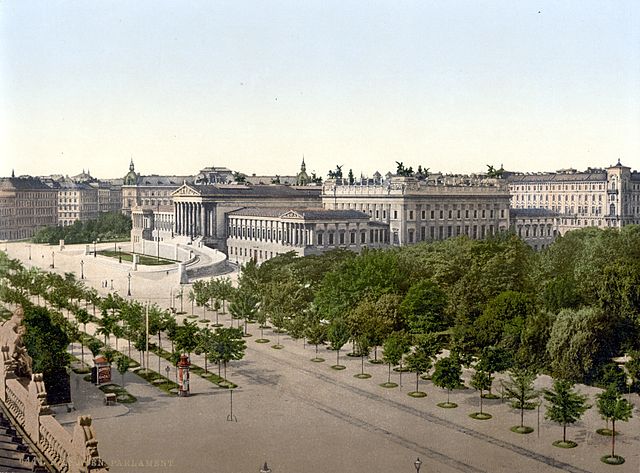
March 11, 2014, by Harry Cocks
Liberalism and Nationalism in the Austro-Hungarian Empire
On the 25th of January 1894 the prominent Jewish liberal politician Heinrich Jaques walked into his lawyer’s office in Vienna and shot himself in the head. As a young lawyer and financier in the 1860s he had written works in support of the Austrian state and the assimilation of Jews. In 1879 he was elected to parliament as a representative of Vienna’s inner city district, the most prestigious seat for a liberal politician. (Vienna’s new Ringstrasse, c. 1900, right). Yet through the 1880s and early 1890s the liberal vision of a progressive Austria seemed to be falling apart under pressure from a conservative government, nationalist politics and a radical, German-nationalist younger generation. In particular, anti-Semitism slowly seeped into politics and everyday life. This especially affected Jaques, as a successful, integrated Austrian Jew. Suffering from depression, Jaques lost faith in the liberal project and took his own life.
Throughout its history, the liberal movement had faced many dilemmas, especially between universal liberal principles – which espoused the values of freedom and liberty – and a narrower German nationalism. German nationalism slowly transformed itself over the course of the late 19th century, from the assertion of cultural and institutional dominance within the Monarchy to a defensive, embattled mindset stressing purity, conflict and exclusion. Historians have generally seen Austro-German liberalism as fighting a losing battle with nationalism in the years leading up to the First World War, not least because many liberal leaders themselves threw in their lot with the rising power of the newer, more radical German nationalism. Historians have tended to agree with the writer Arthur Schnitzler, who recalled that the error of liberals in his youth had been an excessive idealism. They had assumed that “certain idealised values were taken for granted,” leading to a false sense of optimism. “We thought we knew what was true, good and beautiful,” Schnitzler recalled of the period of liberal resurgence in the 1860s, and that “all life lay ahead of us in grandiose simplicity.”
How did the Austrian liberals respond to the harder-edged, more populist movements like nationalism and socialism? Did the development of liberalism demonstrate the “natural” dominance of conservatism in Austrian politics or did the movement lose momentum once it had installed the constitution in 1867 and implemented a number of far-reaching reforms? Indeed, how did the liberals define their project at the beginning of parliamentary life in the 1860s and how did they attempt to redefine and reconfigure their goals in the next three decades?
In Liberalism and the Habsburg Monarchy, 1861-1895 Jonathan Kwan of Nottingham History argues that the record of Austria’s liberals should not be seen in the light of later events, but judged on its own terms. At the outset, the liberals wanted an integrated state and a progressive constitutional system, as well as the rule of law and a free press. In that sense the movement was a wide-ranging, all-encompassing project that aimed to regenerate the Habsburg Monarchy. Yet there was always the assumption of German political and cultural leadership within this regenerated state and society. Over time this German nationalism changed and gradually assumed a predominant role within the movement. The process was neither inevitable nor straightforward. Thus the Austrian liberal project should not be simply viewed as doomed or inherently compromised. The liberals laid the foundations for modern political system based on a constitution, parliament, and a free press. These reforms created the conditions for the remarkable artistic and cultural efflorescence associated with fin-de-siecle Vienna that gave us Freud, Mahler, Klimt and Schnitzler.
Jonathan Kwan, Liberalism and the Habsburg Monarchy, 1861-1895 (Palgrave Macmillan, 2013)
http://us.macmillan.com/liberalismandthehabsburgmonarchy18611895/JonathanKwan
No comments yet, fill out a comment to be the first

Leave a Reply